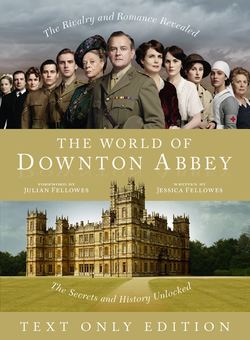Читать книгу The World of Downton Abbey Text Only - Jessica Fellowes - Страница 9
ОглавлениеPREPARING FOR HOUSE PARTIES
The arrival of guests at a house such as Downton is an important event not only for the family, but for the servants, too. Most household staff had real pride in their work and the house in which they served, and visits were a chance to show just how good they were at their jobs. The presence of a very noble visitor, such as a Duke, was considered an honour and the servants would be eager to serve him and make sure that he left feeling that their house was a well-run one.
CARSON
‘It’s certainly a great day for Downton, to welcome a Duke under our roof.’
Preparations at Downton are begun by Cora, who decides which bedrooms will be used, then the right menus are put together with Mrs Patmore – for meals that will show off the best of the home farm produce as well as the cook’s ability to create a worthy feast. Once agreed, the menus are written in French. Cora then decides the placement around the dining table at each meal in advance. At the lunches and dinners, if more people are staying than the footmen could reasonably be expected to serve, the valet is asked to help. Carson might help out in the dining room if necessary, but never a maid – although this rule had to be relaxed on occasion during the war when there weren’t enough men.
Mrs Hughes then makes sure the bedrooms are made up freshly on the day of the guests’ arrival, and clean towels and new soaps are placed in the bathroom. Inkwells must be full, and sheets of Downton Abbey writing paper and envelopes must be laid out on the bedroom table. The head gardener is asked to supply cut flowers for the house and for an arrangement in a vase for each of the guests’ bedrooms.
If the visitors arrive without either a valet or lady’s maid of their own, a footman or housemaid is assigned to them. Branson, the chauffeur, is despatched to the station to meet everyone off the train. Arriving at the house, they are greeted by Lord and Lady Grantham and their daughters, Carson, and William and Thomas, who take the luggage.
Guest luggage is unpacked in a room that has a series of locker-like cupboards. If several ladies are staying, this is the opportunity for their maids to compare the dresses planned for the Saturday-to-Monday and thus avoid anyone wearing anything too similar at the same time.
The footmen, Thomas and William, are the servants most visible to the family and any guests, and therefore they are dressed in tailored livery. They answer the front door, deliver messages to the village, serve in the dining room and stoke the fire if a member of the family is in the room. William is also in charge of walking Pharaoh, Lord Grantham’s Labrador, first thing in the morning and last thing at night, and Thomas has been given the unusual responsibility of cleaning all the clocks in the house, because his father was a clockmaker. Footmen were often known for their arrogance – their appearance gave them an advantage over the rest of the servants and they weren’t afraid to use it.
MRS HUGHES
‘You have to ease up a bit or you’ll give yourself a heart attack. Things cannot be the same when there’s a war on.’
CARSON
‘I do not agree. Keeping up standards is the only way to show the Germans they will not beat us in the end.’
Below stairs, the day begins early, and breakfast is eaten after completing their morning tasks but before the family come down from their bedrooms. Gordon Grimmett, third footman at Longleat House during the First World War, did not look forward to breaking his fast in the morning: ‘It was a picnic kind of meal with people coming and leaving as their duties required. There was little variety, it seemed it was always kedgeree on weekdays and bacon on Sundays. As it was war time we were each given a quarter of a pound of butter a week, which we kept in a small tin; once that was gone it was dry bread.’
Lord Grantham and his daughters, as well as any guests, arrive in the dining room for breakfast at around 9am – Lady Grantham is absent, as married women enjoy the privilege of breakfast in bed. The footmen serve tea, as well as coffee and hot toast, but otherwise everyone helps themselves. This is the most informal meal of the day, when the family themselves lift the lids of silver chafing dishes, kept warm by small oil burners beneath and laden with bacon, eggs, devilled kidneys and porridge. Cold slices of tongue, ham and grouse are placed on the sideboard. Cornflakes, called ‘Post Toasties’, which have come from America, are on the table, with milk from the house’s dairy.
Phyllis Logan is Mrs Hughes
‘I like the scenes with Carson. In those moments they have a chance to be themselves, because they’ve always got his character very much in charge. Carson takes it all very seriously, but when he has his little chats with Mrs Hughes that’s his one opportunity for a bit of a release. So I do enjoy those scenes.’
